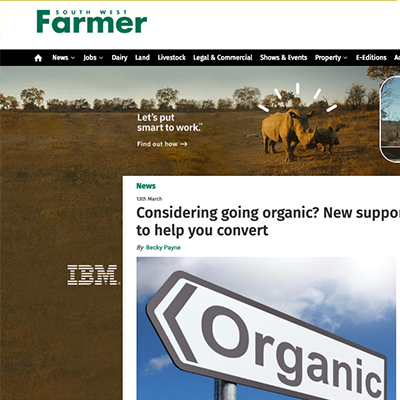Organic conversion service
Organic conversion requires a fundamental change in farm practice and agronomy. This process requires clear information and advice. Currently farmers considering organic conversion are not supported with information on an individual website. OASIS fills a strong requirement to provide a helpline and network of skilled, accredited advisors to support farmers in making the right decisions to mitigate failure and encourage successful new organic businesses for the longer-term benefit of the sector.
The Organic Advisory Support and Information Service (OASIS) provides this website, helpline and team of advisors who work to deliver sector based organic conversion advice and information. We aim to help farmers fully qualify the implications of change and to support the farmer through the organic conversions process with ongoing management advice.
How is the organic conversion service (OASIS) organised
OASIS is a not for profit organisation initially set up by Abacus Agriculture with independent Management Board representation and further independent nominees from the organic sector. The Board co-ordinates the website, the established helpline and the maintenance of the organic conversion advisory network. Abacus staff provide the initial helpline coverage and on-farm. OASIS predicts this network will expand to serve the rising demand from enquiries.
About the OASIS organic conversion website
The OASIS website provides farmers with clear information and practical no nonsense advice to assess their own suitability for organic conversion. Content provides new and existing organic farmers the option to obtain greater clarity and more useful information regarding organic farming and allow them to dig deeper into the history and technical detail of organic agriculture, with links to relevant sites containing extended information on organic farming. There are many areas of organic farming and each area has its information requirements. OASIS aims to make finding help, information and advice as easy and intuitive as possible. The site is currently expanding rapidly. Please get in touch with your specific requirements, as even though you may not yet find everything you need, we are sure to have it ready to put online over the coming months.
Rural Grants and Schemes – the reality
Rural grants to support organic conversion and organic land management options are currently available under the Natural England (NE) Countryside Stewardship agri-environment rural development grant scheme. This grant scheme is now managed by the Rural Payments Agency on behalf of Natural England. Post Brexit Countryside Stewardship will remain open for new applications up until January 2024. In 2025 the new Environmental Land Management Scheme (ELMs) is due to be launched to replace the Basic Payment Scheme and Countryside Stewardship.
At present as the UK transitions through Brexit, the position of rural development support for organic farming is unclear, but optimism remains that grant support will continue.
Advice, Training and Events
The OASIS website provides a portal to many resources for organic farming. Our advisors cover the whole of the UK organic farming community and have over wealth of experience in the organic sectors of arable, horticulture, dairy, beef, sheep, pig and poultry organic farming. The advice, training and events sections of the OASIS website is expanding with new organic courses, organic farming advice resources and regional consultants available to help farmers make the conversion to organic and provide extensive information for existing organic farmers.
Organic Market Information
The organic market continues to grow and there are numerous groups tracking trends and providing useful information for emerging opportunities for organic sales. Data analysis focuses on consumer habits, tracking sales trends and analyses the main supermarket groups, divided into category level detail. Register for the Soil Association Marketing Report here.
Brief history of organic farming in the UK
The market for organic food (as it is now) was tiny 50 years ago, estimated to be less than 0.1 per cent of the market in European countries. Organic farming at that time wasn’t seen positively by most farmers in the UK. However, today as many as two thirds of food consumers in the UK and Germany may regularly buy one or more organic products. The expansion began in the 1970s as more people became interested in health and the environment. In the 1980s and 1990s production and consumption increased, official standards defining organic produce were formulated, and grant aid for organic farming was introduced in the European Union. Even though organic farming is growing rapidly, it remains a minority in land use terms. Over all 28 current member states, according to European Commission statistics, there were 5 million hectares in organic cultivation in 2002, rising to 11.1 million hectares, or 6.2 per cent of the total utilised agricultural area, in 2015. On a world scale, the current annual consumption of organic produce is estimated to be worth over $80 billion, which is about 3 per cent of the value of world agricultural output but rising. This is a growing market.
In short, organic farming is a small but very significant part of world agricultural activity. In public attention terms, it punches well above its weight.




















